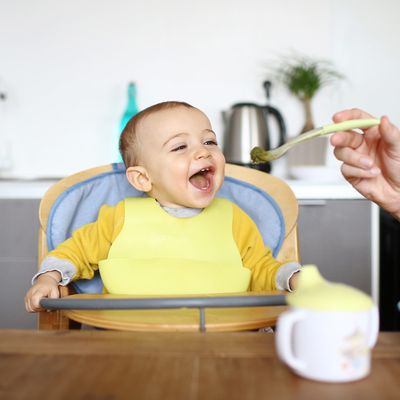
Let’s say you’re an infant. Spend a lot of time in high chairs and in laps. Can’t really move around that much. Do a little gurgling. How do you alight upon your first word? This is a question that has long bedeviled scientists, and for good reason: You can’t exactly ask an infant to explain itself.
But you could, as Indiana University researcher Elizabeth Clerkin and her colleagues did, strap cameras to their precious little heads and record their views of the world during mealtime. The research team did so with eight babies between 8 and 10 months old, for a total of 147 meals. As published in Philosophical Transactions of the Royal Society B, they found that the words most likely be a baby’s first were way more common than others — indeed, just seven items accounted for 33 percent of all “object instances” in a baby’s eating experiences.
They explain it by what they’ve coined as “Pervasiveness Hypothesis,” and it goes like this:
From the infant perspective, individual mealtime scenes are highly cluttered with many different objects in view. However, across the scenes in the corpus, there is a small set of objects that are repeatedly present …
The prevalence of a few object categories biases the candidate referents that are tracked and linked to heard words, a proposal that is supported by the observed correspondence between the set of highly frequent visual objects and normatively first-learned object names.
In less technical language, Clerkin and her colleagues contend that these tiny humans are learning to draw conceptual categories of the world before they start speaking, and what they spend time cogitating about, in their infantile way, are the things that show up the most in their visual sphere. Then, those most thought about objects gurgle out as their first words.
There are limits to this study, adorable as it is to think of camera-headed 8-month-olds. It would be nice to have data from non-eating events. Also, a way larger sample than eight tots would be needed to establish anything beyond what could very well be statistical noise. Still, it’s more evidence that nonverbal babies are way smarter than you think.




